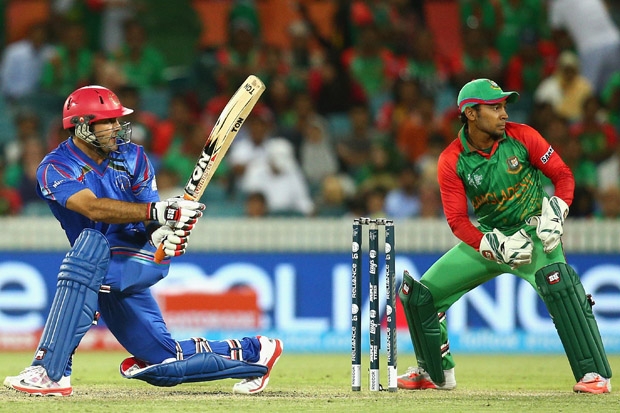Graeme Swann arrived late for the last cricket World Cup. His wife had given birth before the tournament and he was given leave to miss the warm-ups and just arrive for the first match. No need to worry: it was only the Netherlands, the competition’s weakest side. Naturally England nearly lost it, but Swann took two wickets. At the press conference, Swann was asked about leaving his new baby son. ‘I’m sure he’ll give me shit in the future for missing the first two months of his life,’ he said, ‘and I’ll reply: sorry son, I had to go and help England beat the Dutch.’
England have made a habit of being embarrassed by the Dutch. They lost to them at the World Twenty20 in 2009 and 2014, bowled out the second time for 88 by a former assistant manager at the Schiphol airport Burger King. It’s just as well the Orangemen didn’t qualify for the latest global tournament, which started last week. England would only pop their clogs again.
It is 40 years since Sri Lanka and East Africa played in the first World Cup. Some in the world governing body want to restrict the tournament to the big boys, but that would be a shame when there have been such shocks as Kenya beating West Indies in 1996 or Ireland beating Pakistan in 2007. Ireland thrashing West Indies hardly counts as a shock these days.
Four minnows are involved this time. England’s banana skins are Scotland and Afghanistan, while the other group has Ireland and the United Arab Emirates. On the UAE’s only previous appearance, in 1996, their captain, Sultan Zarawani, went out to bat against South Africa’s fearsome Allan Donald wearing a sun hat. He got a bump on the forehead as a souvenir. Their captain this time is a 43-year-old flight purser with Emirates airlines.
Burger flippers and cabin boys are the lifeblood of the World Cup and long may they be allowed to play. Some of their tales are related in a new book by Tim Wigmore and Peter Miller called Second XI: Cricket in its Outposts, which looks at ten aspirant nations (to reflect the fact that all B teams find it hard to get out a full XI).
Afghanistan is perhaps the most interesting tale. Cricket was the only sport tolerated by the Taleban. It was played in the refugee camps that sprung up after the Soviet invasion in the 1980s. When Afghanistan first entered an international competition, in Malaysia in 2004, none of the team had flown before. Two years later they beat a touring MCC side by 171 runs. Now they are at their first World Cup; who would begrudge them their ambition to play Test cricket one day?
The key is to believe you can win. The book has a lovely tale of Ireland’s victory over England in Bangalore in 2011, when Kevin O’Brien hit 113 off 63 balls. Having kept out a yorker from Jimmy Anderson, O’Brien remarked: ‘Good ball.’ This riled Jimmy. ‘How would you know what a good ball is?’ he sneered. ‘I might not,’ O’Brien replied, ‘but I know what a bad one is and I just hit your last one over there.’ And he gestured into the stand. Long may cricket’s minnows keep hitting their critics out of the ground. The great Matthew Engel, incidentally, is quoted as remarking in Wisden in 2006 that the addition of Ireland was ‘ruining the World Cup’, and that ‘the idea they can provide proper opposition… is ludicrous’. We all make mistakes.
Though you can rarely get more mistaken than umpires Aleem Dar and Kumar Dharmasena, who gave Anderson run out at the end of England’s humiliating defeat to Australia at the weekend. The ball was clearly dead. I find it baffling that neither Dar or Dharmasena seem to have been punished, nor the third umpire Billy Bowden or the match referee Martin Crowe. One hates to say this, but heads should probably roll.







Comments